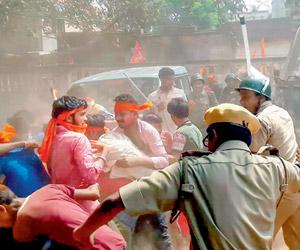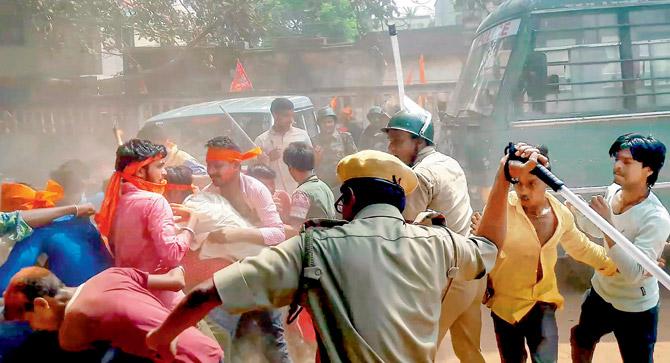To be mute observers is to be complicit in the hatred and religious triumphalism that fundamentalists and political parties propagate


Ram Navami clashes in Murshidabad on Monday. Usually, the tenets of any religion have absolutely nothing to do with the way fundamentalists and political parties will use that religion to further their ends. Pic/PTI
 This Ram Navami, there was violence in Bihar and Bengal. Like most communal violence in India, there was provocation, there was retaliation, there was mayhem, arson, looting, vandalism, destruction and also, now, death.
This Ram Navami, there was violence in Bihar and Bengal. Like most communal violence in India, there was provocation, there was retaliation, there was mayhem, arson, looting, vandalism, destruction and also, now, death.
ADVERTISEMENT
To some of us, there is a clear pattern at work here. Ever since Nitish Kumar opted out of the "grand alliance" of the JDU, RJD and Congress, which fought the state elections together, and went back to the BJP-led NDA, anti-Muslim and anti-Dalit incidents have increased in Bihar. In Bengal, the rise of Mamata Banerjee and the Trinamool Congress has led to a corresponding rise of the BJP as an Opposition party. And, like in Kerala, the BJP and its associates and affiliates have been working hard to increase Islamophobia as well as create a larger Hindutva following. Banerjee's strategy has been to try and create a sort of "good" Hindu to counter the BJP's "bad" Hindu, but judging from results in Bengal, this is not working. It is also dangerous to use religion to counter a movement like Hindutva that is based solely on religious triumphalism and hatred.
Usually, the tenets of any religion have absolutely nothing to do with the way fundamentalists and political parties will use that religion to further their ends. There is no point in using religion to take them on. Their currency is a combination of hatred, ignorance and violence.
The question for us is how far are we going to allow this to go? There are few, if any, parts of India, which do not know the terrible cost of sectarian violence. We also know that the justice system is most weak when it comes to politically motivated violence. Culprits vanish, the victims are sometimes charged, witnesses will eventually turn hostile, if there are witnesses at all, governments will change, ideologies will change, the investigating agencies will be compromised and dare one mention the judiciary and its role here at all?
Ultimately, then, it comes down to us. Do we approve of this violence? Do we feel that X community or Y community deserves being attacked? Do we justify this with some potted idea of history? Do we have the intelligence or the good sense to gain a larger, less literal perspective on events?
Historical wrongs, whether imagined or real, cannot and must not be avenged by violence today. Do we have the sense to see when we are being manipulated? To move away from those who want to use our innocence to make us accept the unconscionable?
It is our future that is at stake. For some of us, what is playing out across India is inevitable once the BJP won the general elections so emphatically in 2014. Narendra Modi promised the moon, but has not been able to deliver even one low-level paper plane. Even as the party has won state after state across India or has colluded and collaborated to form governments in states it has not won, the Union government has been found severely wanting.
All the problems facing us have been underlined and outlined any number of times in the past four years. Of the worst remains demonetisation and its spiralling effect on lives, livelihoods, industries, economic sectors, agriculture and the economy itself. The government and its supporters have remained consistently averse to any criticism and unable to find any solutions to the problems that it has created. The crisis in the banking sector emphasises the danger for the future.
The prime minister may remain silent on the state of the nation, but his party machinery is very active, whether working through Cambridge Analytica in cyberspace or motorcycle rallies of youths carrying weapons. The horror that they leave in their stead leaves scars that take years to heal, if ever. Is that a price worth paying for the future of India to deal with?
To argue that all this has happened before is a coward's defence mechanism, an inability or reluctance to face a problem upfront. It is using banality to whitewash the present. And, it is unacceptable.
One of the acts of the hooligans in Bengal was to pull down a bust of freedom fighter and educationist Maulana Azad. "I am part of the indivisible unity that is Indian nationality," Azad had once memorably said. Shame on us who applaud such violence on the idea of the Indian nation.
Ranjona Banerji is a senior journalist. You can follow her on Twitter @ranjona Send your feedback to mailbag@mid-day.com
Catch up on all the latest Mumbai news, crime news, current affairs, and also a complete guide on Mumbai from food to things to do and events across the city here. Also download the new mid-day Android and iOS apps to get latest updates
 Subscribe today by clicking the link and stay updated with the latest news!" Click here!
Subscribe today by clicking the link and stay updated with the latest news!" Click here!







